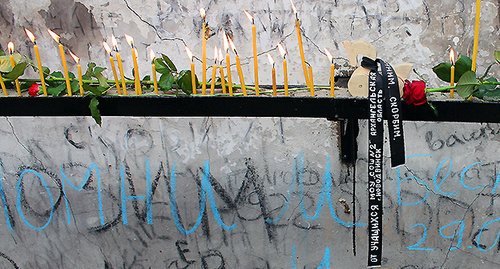
02 September 2014, 11:43
"Levada-Centre": 64% of Russian citizens believe authorities did their best to rescue hostages in Beslan
Over 10 years from the date when militants had seized the Beslan School No. 1, the proportion of people, who believe that the Russian authorities and law enforcers did everything possible to rescue the hostages, has increased from 52% to 64%, states the "Levada-Centre" following the results of the public questioning. Number of respondents who treated measures taken by the authorities as insufficient decreased to 24%.
On September 1, 2004, a grouping of terrorists seized 1128 hostages at the School No. 1 of Beslan. The special operation to free the hostages was completed only on September 3, 2004. 186 children and 148 adults fell victim to the terror act. 12 special agents and one local resident, who helped in freeing the hostages, were killed during the storming of the school building. 810 persons of hostages, FSB special fighters, staff members of the Ministry for Emergencies (MfE), the Ministry of Internal Affairs (MIA), and internal troops were injured.
According to the questioning of the "Levada-Centre", timed to the 10th anniversary of the terror act, 56% of respondents assess the law enforcers' operation to free the hostages as satisfactory. If in September 2004, two thirds of respondents (61%) treated measures taken by the authorities as insufficient, then in 2014, their portion decreased to only 24%. At the same time, the proportion of the respondents, who find it difficult to answer the question whether the authorities tell them the truth about the events in Beslan has increased from 4% to 26%.
The portion of those respondents, who rest the responsibility for the hostages' deaths upon the federal authorities, has actually hardly changed: in 2004, 19% of the respondents expressed the above opinion, and at present, their portion is 17%. Meanwhile, at present, only 13% of the respondents (23% in 2004) blame the North-Ossetian authorities, and 39% of the respondents (28% in 2004) believe that the terrorists only are responsible for the hostages' deaths.
On August 22-25, 2014, the "Levada-Centre" conducted the questioning among the urban and rural residents. Staff members of the analytical centre have interviewed one thousand and six hundred persons over 18-year-old in 134 dwelling settlements of 46 regions of the Russian Federation, the website of the "Levada-Centre" reported on September 1.
The results of the questioning correlate with the Vladimir Putin trust index, which has greatly increased against the background of the events in the eastern part of Ukraine, believes Marina Litvinovich, the leader of the public campaign "Remember Beslan".




